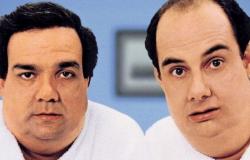Writer of the movement, Jean Echenoz has no equal in leading an intrigue without seeming to touch it, having fun with the codes of the detective and the adventure story in this inimitable, virtuoso style, which gave him earned so many honors since his first novel, The Greenwich meridian in 1980, including the Medici Prize for Cherokee in 1983 and Goncourt for I’m leaving in 1999, all published by Editions de Minuit.
At Jean Echenoz, the page like a cinema screen
From the Black Series to the B Series
Here, even the protagonist seems disinterested in the plot. Robert Bristol, who gives his name to the title, neither saw nor heard anything of the fall as he left the building on rue des Eaux. Or he has better things to do, besides he has “already seen a lot of deaths in a lot of films, including the ones he shot”several fictions of various genres and with very relative success. The real downfall is probably his own, but before that he has an appointment to bring to the screen a book by Marjorie des Marais, the famous “woman with three hundred bestsellers”. Once settled the negotiations which will see the young actress Céleste Oppen preferred to the much more bankable Nadia Saint-Clair, the adaptation will take the reader to southern Africa. We will come across, among other secondary roles, a hunk named Jacky Pasternac who “would be quite easy to describe but we don’t really want to” ; the movie-loving commander of a Botswana rebel group; or an elephant who turns out to be an excellent actor.
We move on and from the Black Series here is Jean Echenoz rendered in full B series, which is certainly not a coincidence as the author has become a master of narrative techniques borrowed from cinema, changes of scale and focal length, sequence shots, off-screen and cuts to split a menhir.
Jean Echenoz, Writing
A great stylist
Discreet homage to the seventh art, Bristol evokes the popular cinema of the seventies (impossible not to think of Gorgeous by Philippe de Broca) as Werner Fassbinder and his German contemporaries (subject of a memorable tirade by Commander Parker), among other more or less explicit references such as Bernardo Bertolucci, Chantal Ackerman, Billy Wilder.
From the latter, Echenoz has a sense of rhythm, unstoppable humor and extraordinary lightness. Its high lexical precision goldwork (go ahead and let me send you some “melliflu”of the“infrutescence” a you “malafoutier”) and his immense talent as a stylist (and go ahead and let me zeugme you, oxymorate you and anacolyte you), not forgetting to include here an alexandrine, there a commentary on his own processes (“let’s prefer the ellipse to the hypotyposis”) and alleged weaknesses (“a professional would know how to do it very well but when you are only an amateur”), fly so high that we sometimes lose all sense of gravity.
-The risk, in the little game of mocking one’s own plot – to the point of sometimes “regret[r] a little that it borders on pants”even notes the investigator Claveau – is to make the reader switch off. As such it is perhaps not the greatest Echenoz that we have read, but Bristol remains a delight of choice.
⇒ Bristol | Novel | Jean Echenoz | Midnight, 208 pp., €19, digital €14
Extract
“Very pretty,” Claveau repeats, pointing to the futon, “I always wondered if it was really comfortable. Do you want to try it? Michèle suggests, sitting down on it. Come and sit down, don’t be afraid. does so while keeping a regulatory distance, she looks at him and approaches. You know I missed you, she says Cut to black.
But since we forgot to turn off the sound, some echoes of this scene reach us.”





